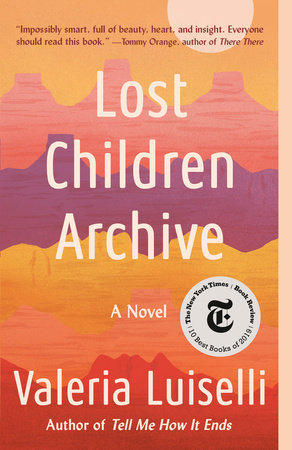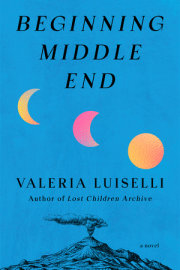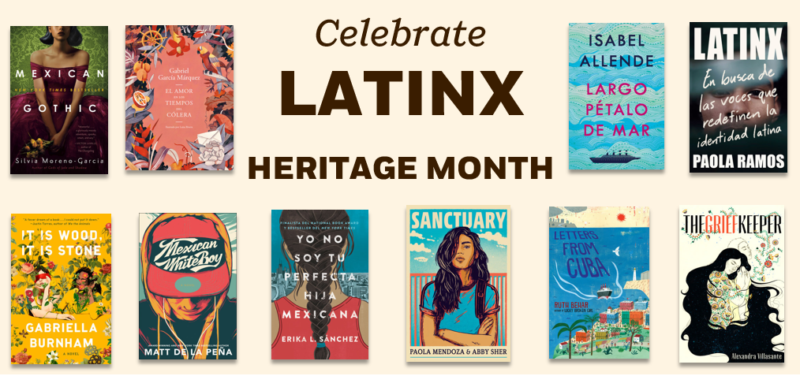Part IFamily SoundscapeRelocationsAn archive presupposes an archivist, a hand that collects and classifies.
—Arlette Farge
To leave is to die a little.
To arrive is never to arrive.
—Migrant prayer
DepartureMouths open to the sun, they sleep. Boy and girl, foreheads pearled with sweat, cheeks red and streaked white with dry spit. They occupy the entire space in the back of the car, spread out, limbs offering, heavy and placid. From the copilot seat, I glance back to check on them every so often, then turn around again to study the map. We advance in the slow lava of traffic toward the city limits, across the GW Bridge, and merge onto the interstate. An airplane passes above us and leaves a straight long scar on the palate of the cloudless sky. Behind the wheel, my husband adjusts his hat, dries his forehead with the back of his hand.
Family LexiconI don’t know what my husband and I will say to each of our children one day. I’m not sure which parts of our story we might each choose to pluck and edit out for them, and which ones we’ll shuffle around and insert back in to produce a final version—even though plucking, shuffling, and editing sounds is probably the best summary of what my husband and I do for a living. But the children will ask, because ask is what children do. And we’ll need to tell them a beginning, a middle, and an end. We’ll need to give them an answer, tell them a proper story.
The boy turned ten yesterday, just one day before we left New York. We got him good presents. He had specifically said:
No toys.
The girl is five, and for some weeks has been asking, insistently:
When do I turn six?
No matter our answer, she’ll find it unsatisfactory. So we usually say something ambiguous, like:
Soon.
In a few months.
Before you know it.
The girl is my daughter and the boy is my husband’s son. I’m a biological mother to one, a stepmother to the other, and a de facto mother in general to both of them. My husband is a father and a stepfather, to each one respectively, but also just a father. The girl and boy are therefore: step-sister, son, stepdaughter, daughter, step-brother, sister, stepson, brother. And because hyphenations and petty nuances complicate the sentences of everyday grammar—the us, the them, the our, the your—as soon as we started living together, when the boy was almost six and the girl still a toddler, we adopted the much simpler possessive adjective our to refer to them two. They became: our children. And sometimes: the boy, the girl. Quickly, the two of them learned the rules of our private grammar, and adopted the generic nouns Mama and Papa, or sometimes simply Ma and Pa. And until now at least, our family lexicon defined the scope and limits of our shared world.
Family PlotMy husband and I met four years ago, recording a soundscape of New York City. We were part of a large team of people working for the New York University’s Center for Urban Science and Progress. The soundscape was meant to sample and collect all the keynotes and the soundmarks that were emblematic of the city: subway cars screeching to a halt, music in the long underground hallways of Forty-Second Street, ministers preaching in Harlem, bells, rumors and murmurs inside the Wall Street stock exchange. But it also attempted to survey and classify all the other sounds that the city produced and that usually went by, as noise, unnoticed: cash registers opening and closing in delis, a script being rehearsed in an empty Broadway theater, underwater currents in the Hudson, Canada geese flocking and shitting over Van Cortlandt Park, swings swinging in Astoria playgrounds, elderly Korean women filing wealthy fingernails on the Upper West Side, a fire breaking through an old tenement building in the Bronx, a passerby yelling a stream of motherfuckers at another. There were journalists, sound artists, geographers, urbanists, writers, historians, acoustemologists, anthropologists, musicians, and even bathymetrists, with those complicated devices called multibeam echo sounders, which were plunged into the waterspaces surrounding the city, measuring the depth and contours of the riverbeds, and who knows what else. Everyone, in couples or small groups, surveyed and sampled wavelengths around the city, like we were documenting the last sounds of an enormous beast.
The two of us were paired up and given the task of recording all the languages spoken in the city, over a period of four calendar years. The description of our duties specified: “surveying the most linguistically diverse metropolis on the planet, and mapping the entirety of languages that its adults and children speak.” We were good at it, it turned out; maybe even really good. We made a perfect team of two. Then, after working together for just a few months, we fell in love—completely, irrationally, predictably, and headfirst, like a rock might fall in love with a bird, not knowing who the rock was and who the bird—and when summer arrived, we decided to move in together.
The girl remembers nothing about that period, of course. The boy says he remembers that I was always wearing an old blue cardigan that had lost a couple of buttons and came down to my knees, and that sometimes, when we rode the subway or buses—always with freezing air pouring out—I’d take it off and use it as a blanket to cover him and the girl, and that it smelled of tobacco and was itchy. Moving in together had been a rash decision—messy, confusing, urgent, and as beautiful and real as life feels when you’re not thinking about its consequences. We became a tribe. Then came the consequences. We met each other’s relatives, got married, started filing joint taxes, became a family.
InventoryIn the front seats: he and I. In the glove compartment: proof of insurance, registration, owner’s manual, and road maps. In the backseat: the two children, their backpacks, a tissue box, and a blue cooler with water bottles and perishable snacks. And in the trunk: a small duffle bag with my Sony PCM-D50 digital voice recorder, headphones, cables, and extra batteries; a large Porta-Brace organizer for his collapsible boom pole, mic, headphones, cables, zeppelin and dead-cat windshield, and the 702T Sound Device. Also: four small suitcases with our clothes, and seven bankers boxes (15″ x 12″ x 10″), double-thick bottoms and solid lids.
CovalenceDespite our efforts to keep it all firmly together, there has always been an anxiety around each one’s place in the family. We’re like those problematic molecules you learn about in chemistry classes, with covalent instead of ionic bonds—or maybe it’s the other way around. The boy lost his biological mother at birth, though that topic is never spoken about. My husband delivered the fact to me, in one sentence, early on in our relationship, and I immediately understood that it was not a matter open to further questions. I don’t like to be asked about the girl’s biological father, either, so the two of us have always kept a respectful pact of silence about those elements of our and our children’s pasts.
In response to all that, perhaps, the children have always wanted to listen to stories about themselves within the context of us. They want to know everything about when the two of them became our children, and we all became a family. They’re like anthropologists studying cosmogonic narratives, but with a touch more narcissism. The girl asks to hear the same stories over and over again. The boy asks about moments of their childhood together, as if they had happened decades or even centuries ago. So we tell them. We tell them all the stories we’re able to remember. Always, if we miss a part, confuse a detail, or if they notice any minimal variation to the version they remember, they interrupt, correct us, and demand that the story be told once more, properly this time. So we rewind the tape in our minds and play it again from the beginning.
Foundational MythsIn our beginning was an almost empty apartment, and a heat wave. On the first night in that apartment—the same apartment we just left behind—the four of us were sitting in our underwear on the floor of the living room, sweaty and exhausted, balancing slices of pizza on our palms.
We’d finished unpacking some of our belongings and a few extra things we’d bought that day: a corkscrew, four new pillows, window cleaner, dishwashing soap, two small picture frames, nails, hammer. Next we measured the children’s heights and made the first marks on the hallway wall: 33 inches and 42 inches. Then we’d hammered two nails into the kitchen wall to hang two postcards that had hung in our former, respective apartments: one was a portrait of Malcolm X, taken shortly before his assassination, where he’s resting his head on his right hand and looking intently at someone or something; the other was of Emiliano Zapata, standing upright, holding a rifle in one hand and a saber in the other, a sash around one shoulder, his double cartridge belt crosswise. The glass protecting the postcard of Zapata was still covered in a layer of grime—or is it soot?—from my old kitchen. We hung them both next to the refrigerator. But even after this, the new apartment still looked too empty, walls too white, still felt foreign.
The boy looked around the living room, chewing pizza, and asked:
Now what?
And the girl, who was two years old then, echoed him:
Yes what?
Neither of us found an answer to give them, though I think we did search hard for one, perhaps because that was the question we’d also been silently threading across the empty room.
Now what? the boy asked again.
Finally, I answered:
Now go brush your teeth.
But we haven’t unpacked our toothbrushes yet, the boy said.
So go rinse your mouths in the bathroom sink and go to sleep, my husband replied.
They came back from the bathroom, saying they were scared to sleep alone in the new bedroom. We agreed to let them stay in the living room with us, for a while, if they promised to go to sleep. They crawled into an empty box, and after puppying around for the fairest division of cardboard space, they fell into a deep, heavy sleep.
My husband and I opened a bottle of wine, and, out the window, we smoked a joint. Then we sat on the floor, doing nothing, saying nothing, just watching the children sleep in their cardboard box. From where we were sitting, we could see only a tangle of heads and butts: his hair damp with sweat, her curls a nest; he, aspirin-assed, and she, apple-bottomed. They looked like one of those couples who’ve overstayed their time together, become middle-aged too fast, grown tired of each other but comfortable enough. They slept in total, solitary companionship. And now and then, interrupting our maybe slightly stoned silence, the boy snored like a drunk man, and the girl’s body released long, sonorous farts.
They’d given a similar concert earlier that day, while we rode the subway from the supermarket back to our new apartment, surrounded by white plastic bags full of enormous eggs, very pink ham, organic almonds, corn bread, and tiny cartons of organic whole milk—the enriched and enhanced products of the new, upgraded diet of a family with two salaries. Two or three subway minutes and the children were asleep, heads on each of our laps, tangled humid hair, lovely salty smell like the warm giant pretzels we’d eaten earlier that day on a street corner. They were angelic, and we were young enough, and together we were a beautiful tribe, an enviable bunch. Then, suddenly, one started snoring and the other stared farting. The few passengers who were not plugged into their telephones took note, looked at her, at us, at him, and smiled—difficult to know if in compassion or complicity with our children’s public shamelessness. My husband smiled back at the smiling strangers. I thought for a second I should divert their attention, reflect it away from us, maybe stare accusingly at the old man sleeping a few seats from us, or at the young lady in full jogging gear. I didn’t, of course. I just nodded in acknowledgment, or in resignation, and smiled back at the subway strangers—a tight, buttonhole smile. I suppose I felt the kind of stage fright that comes up in certain dreams, where you realize you went to school and forgot to put on underwear; a sudden and deep vulnerability in front of all those strangers being offered a glimpse of our still very new world.
But later that night, back in the intimacy of our new apartment, when the children were asleep and were making all those beautiful noises all over again—real beauty, always unintentional—I was able to listen to them fully, without the burden of self-consciousness. The girl’s intestinal sounds were amplified against the wall of the cardboard box and traveled, diaphanous, across the almost empty living room. And after a little while, from somewhere deep in his sleep, the boy heard them—or so it seemed to us—and replied to them with utterances and mumbles. My husband took note of the fact that we were witnessing one of the languages of the city soundscape, now put to use in the ultimately circular act of conversation:
A mouth replying to a butthole.
I suppressed the desire to laugh, for an instant, but then I noticed that my husband was holding his breath and closing his eyes in order to not laugh. Perhaps we were a little more stoned than we thought. I became undone, my vocal cords bursting into a sound more porcine than human. He followed, with a series of puffs and gasps, his nasal wings flapping, face wrinkling, eyes almost disappearing, his entire body rocking back and forth like a wounded piñata. Most people acquire a frightening appearance in mid-laughter. I’ve always feared those who click their teeth, and found those who laugh without emitting a single sound rather worrisome. In my paternal family, we have a genetic defect, I think, which manifests in snorts and grunts at the very end of the laughing cycle—a sound that, perhaps for its animality, unleashes another cycle of laughter. Until everyone has tears in their eyes, and a feeling of shame overcomes them.
I took a deep breath and wiped a tear from my cheek. I realized then that this was the first time my husband and I had ever heard each other laugh. With our deeper laughs, that is—a laugh unleashed, untied, a laugh entire and ridiculous. Perhaps no one really knows us who does not know the way we laugh. My husband and I finally recomposed ourselves.
It’s mean to laugh at the expense of our sleeping children, yes? I asked.
Yes, very wrong.
Copyright © 2020 by Valeria Luiselli. All rights reserved. No part of this excerpt may be reproduced or reprinted without permission in writing from the publisher.







